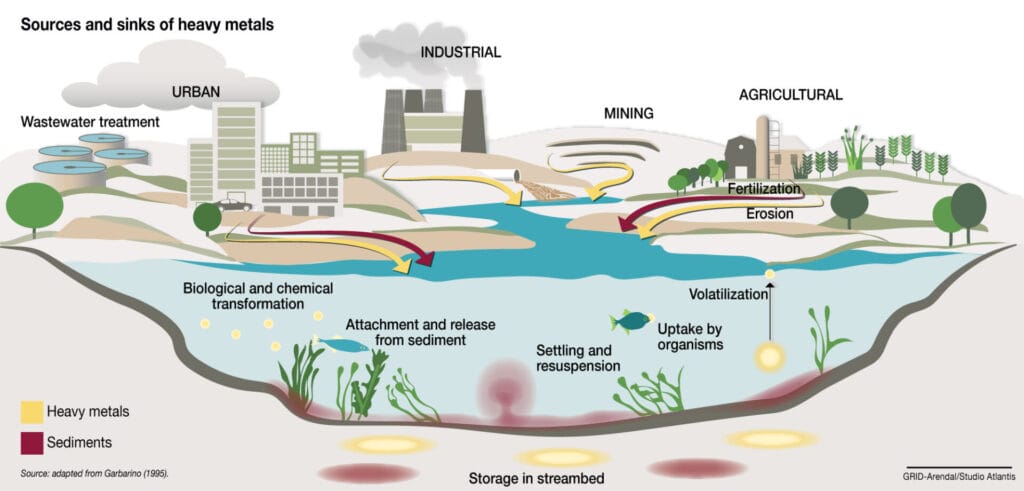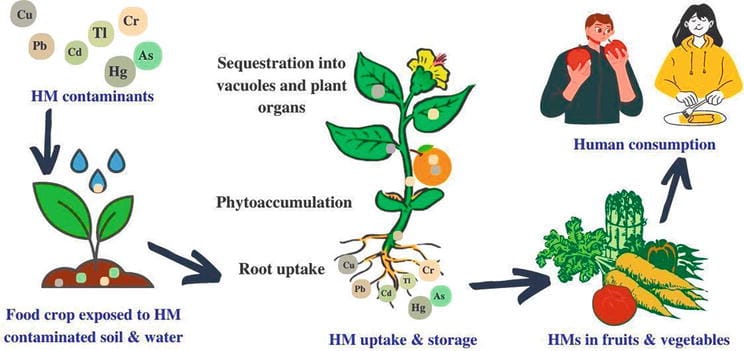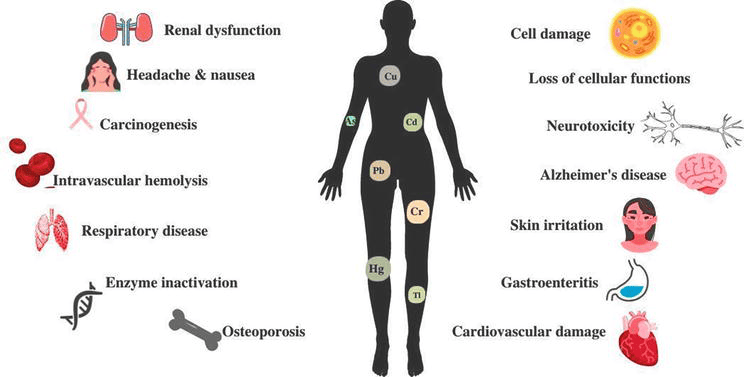A recent report by the Environmental Management & Policy Research Institute (EMPRI) finding heavy metal contamination in vegetables sold in Bengaluru markets has sparked concern among the city’s residents. The report, which was written in November 2022, was featured by the Deccan Herald in October this year. The report found that 10 common vegetables, including tomatoes, onions and spinach, were found to have unsafe quantities of heavy metals. We look at the main findings of the study.
What are heavy metals?
Heavy metals literally refer to metals that are dense or heavy in terms of their atomic weight. These metals are commonly found in nature and include widely used substances like iron, copper, gold and aluminum. Several heavy metals, such as iron and zinc, are also found naturally in soil, water, air, food and the human body, and are even beneficial for our survival.
These metals are also used in many manufacturing industries and often make their way into industrial waste, particularly wastewater. When such industrial wastewater is untreated and makes its way into water sources, such as rivers, lakes or groundwater, heavy metals and other pollutants leach into other organisms, including our food crops, livestock or fish.

This process is called bioaccumulation. Eventually, these metals can find their way into human bodies. This is, of course, a matter of concern, as these metals are toxic at high levels and can impair normal bodily function. EMPRI researchers have uncovered exactly this.

Read more: Why are Bengaluru lakes green in colour?
The EMPRI study
The government agency tested samples of 10 common vegetables: carrot, beans, potato, onion, tomato, brinjal, capsicum, green chilli, coriander and spinach. The vegetables were collected from four different types of vegetable markets: retail markets or supermarkets, local markets, including open air markets with vendors, organic stores, and the government-run HOPCOMS stores. Four hundred samples of vegetables from these stores were tested for cadmium, nickel, iron, lead, copper, zinc, chromium and manganese.
Markets tested
- Supermarkets: Big Bazaar, BTM Layout; Metro Cash & Carry, Kanakapura Road; Spar Vega City Mall, Bannerghatta Road; More Mega Mart, Bannerghatta Road; and Reliance Fresh, Jayanagar
- Local markets: In Malleshwaram, Yeshwanthpur, Banashankari, Gandhi Bazaar and KR Market
- Organic Stores: Organic World, Vasanthnagar; Village Naturals, ISRO layout; Grameena Angadi, Rajajinagar; Namdhari’s Fresh, Indiranagar; and Desi Organics and Naturals, Vajrahalli
- HOPCOMS: Lalbagh, Yelahanka, Shanthinagar, Hebbal and Raja Rajeshwarinagar
The findings
All vegetables from all five supermarkets had at least one heavy metal above safe limits prescribed by the Food and Agriculture Organisation and the World Health Organization (WHO). All the vegetables tested in all five supermarkets were found to have the metal cadmium at unsafe levels. In addition, 8 out of 10 vegetable types were also found to have unsafe levels of nickel in two supermarkets: Big Bazaar in BTM Layout and Metro Cash and Carry in Kanakapura Road.
Similarly, in all five local markets, all the vegetables were found to have unsafe levels of cadmium. The researchers also found unsafe levels of lead in all vegetables at Yeshwanthpur, Gandhi Bazaar and KR Market, and 9 out of 10 vegetables in the Malleshwaram market.
The results were more mixed among the HOPCOMS stores sampled. At the Shanthinagar and Hebbal HOPCOMS, 8 out of 10 vegetables were found to have high levels of cadmium. At the Lalbagh HOPCOMS, four vegetables, spinach, brinjal, tomato and coriander, also had unsafe levels of cadmium.
The majority of the vegetables at the Hebbal and Raja Rajeshwarinagar HOPCOMS also had unsafe levels of lead. The lowest number of contaminated vegetables were at the Yelahanka HOPCOMS.
By far, the safest retail option that emerges from the study is organic stores, with the least number of vegetables with contaminants. Organic World in Vasanthnagar had five contaminated samples. One sample (of green beans) had unsafe levels of iron; two samples (beans and spinach) had unsafe levels of zinc; and two samples (coriander and brinjal) had unsafe levels of copper.
Similar results were found for Village Naturals Organic Store in ISRO Layout. One out of the 10 vegetables tested were found to have unsafe levels of zinc at Namdhari Fresh, Indiranagar (spinach), and Desi Organics, Vajrahalli (beans).
Cadmium toxicity
One of the most common heavy metal contaminants detected by the report is cadmium.
Cadmium is a rare metal that occurs in very small amounts in nature. But unsafe levels of cadmium can accumulate in vegetables or food crops if it is present in excessive levels in soil or water. Cadmium is used in manufacturing industries like textile or battery production and is a commonly seen in the effluents of these industries. It is also a byproduct of agricultural fertilisers, particularly phosphate fertilisers. Cadmium ingested with food is mostly excreted by the human body. But at high levels, the metal can accumulate in the kidneys and impair function.
Alarming levels of cadmium in supermarket vegetables
WHO suggests 0.2mg of cadmium per kg of leafy vegetables, 0.3mg per kg of root vegetable, and 0.1mg per kg of other vegetables is safe. The study detected alarming levels of cadmium in supermarket vegetables. The level of cadmium per kg of vegetable ranged from 17.36 mg/kg vegetable at Reliance Fresh, Jayanagar, to a whopping 53.6 mg/kg vegetables at Big Bazaar in BTM Layout.
Average cadmium values were a little lower, but still well above the safe limits in local markets. In the Banashankari vegetable market, 3.9 mg of cadmium/kg vegetable was detected while at KR market, 17mg of cadmium/kilogram of vegetable was detected.
One HOPCOMS store in Yelahanka and all organic stores were well within the safe limits of cadmium prescribed by WHO.

Source of heavy metal contamination
While the results are straightforward, the inferences drawn from the report are somewhat questionable. The researchers did not examine the potential sources for these heavy metals in the vegetables. They did not trace the producers or farmers from whom the retail stores procured vegetables.
The report refers to a 2015 Citizen Matters article, which shows that supermarkets, HOPCOMS and vegetable vendors mainly purchased vegetables from Agricultural Produce & Livestock Market Committee (APMCs).
APMCs are government-run marketplaces, where farmers can sell their produce for fair prices. The main market is located in Yeshwanthpur, with several submarkets in KR Puram, Nelamangala, Vaderahalli, Binny Mills, etc. Supermarkets in Bengaluru also purchase from HOPCOMS.
A more recent study from 2022 by researchers from Azim Premji University reported that retail chains or supermarkets had collection centres in the peri-urban areas of the city and direct contracts with farmers. Some organic chains, like Namdhari Fresh, had their own farms and also purchases directly from farmers.
However, the exact source of vegetables in each market tested in the study is unknown. Yet, the report implies that the heavy metals accumulated in the vegetables were likely due to water used for irrigation. Plants can accumulate heavy metals through soil, water and air.
Industrial wastewater or effluents are known to be common source of heavy metals. Industries in Bengaluru and neighbouring districts, like Ramanagara, have been documented to release untreated effluents into nearby waterbodies. Such pollution has been documented in Bellandur lake in the city, Byramangala lake in Ramanagara, and the Vrishabhavathi river near the Peenya industrial estate.
Read more: Why Bellandur lake spews toxic froth, and how to stop it
Farmers blamed
These water bodies are important sources of irrigation for farmers. These locations also supply vegetables to the city. Therefore, it is possible that industrial effluents in the irrigation water are a major source of the contamination, but there is no actual evidence for the connection.
Based on this premise, the report focuses on farmers as the root cause of the issue. Of the six recommendations in the report, four are aimed at farmers. The recommendations include farmers mandatorily testing soil and water. It also suggests that farmers “should not resort to unethical farming practices such as irrigating the crops with drainage and effluent waters.”
However, the agency does not provide any evidence that farmers are deliberately irrigating crops with untreated effluents. Curiously, there are no recommendations to the government or industry to treat effluents. Meanwhile, the study also ignores another major potential source for the heavy metals: inorganic fertilisers and pesticides.
Organic vs chemical inputs in agriculture
Vegetables in organic stores showed the least amounts of heavy metals, including cadmium. Like industrial effluents, fertilisers and pesticides used in inorganic farming are also sources of heavy metals. Agricultural chemicals are a major source of metals like cadmium as well as other metals like lead, copper and zinc. Yet, the report does not address agricultural inputs as a potential source of concern. It is possible that a combination of industrial effluents and agricultural inputs are behind the heavy metal levels in the vegetables. However, the report does not address this.
Recommendations and measures
Following the concern that the report sparked, the National Green Tribunal (NGT) took up suo-moto notice of the issue last month.
In a report to the NGT, EMPRI noted that the study published in 2022 was only a preliminary report and was not yet peer reviewed or validated by subject experts. The agency also stressed that the study comprised one time sampling in a single season, which was not statistically significant. EMPRI wrote to the NGT that a larger study with more samples, covering more seasons, would provide more reliable information about the status of vegetables in the city.
The original team that conducted the research has since left EMPRI. We were unable to confirm with EMPRI officials if the agency had commissioned further research into the issue.
When the report was first published in October, the Food Safety and Standard Authority of Karnataka also began a testing drive across the city and promised to take legal action, including fine and prison sentence, against stores selling vegetables with heavy metal contamination. No details have been made public by FSSAI yet.
Found this article very informative . It sheds light on a very topical subject of public safety , from the viewpoint of toxic heavy metal contamination, in the vegetable produce marketed across the City , as reported by EMPRI. The author , examines the subject from all potential angles , and emphasizes the need for further introspection and an enlarged in- depth study ,while addressing related larger issues of public health and safety .